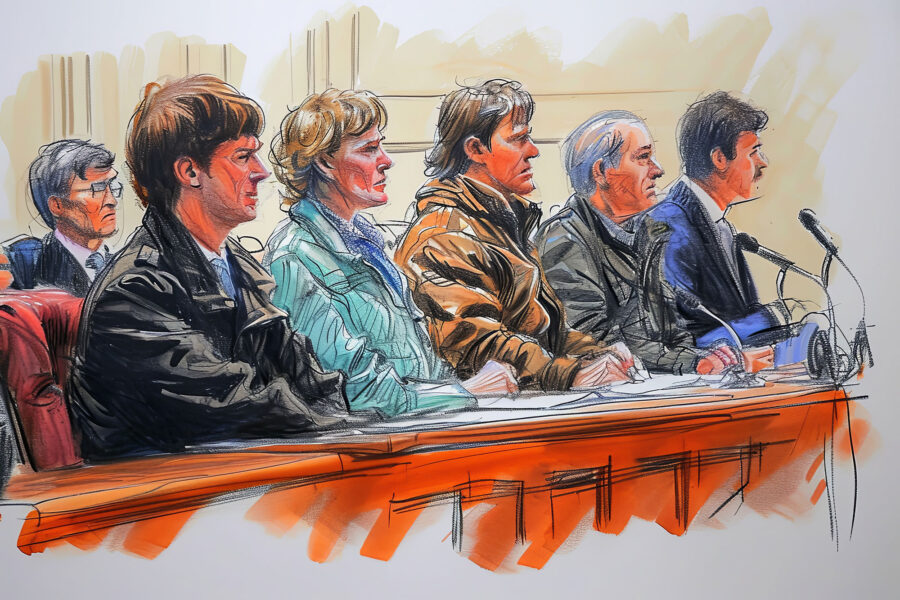When you’re facing a murder charge, your freedom, your future, and your reputation are all on the line. But when that charge is splashed across the news, with cameras at every corner and public judgment following every court date, the stakes get even higher. High-profile murder cases don’t just play out in court—they play out in the court of public opinion, across headlines, hashtags, and 24/7 media cycles. In these cases, the need for experienced, strategic, and fearless legal representation isn’t just important—it’s essential.
At DeGuerin & Dickson, we’ve built our reputation on defending people when the spotlight is brightest and the pressure is greatest. Here’s what you need to know if you or someone you love is facing a murder accusation, especially when the case is making headlines.
Why Proper Representation in Any Murder Case Is Critical
1. The Law Is Complex—and Unforgiving
Texas law classifies murder as a first-degree felony, carrying penalties from five years to life in prison. Capital murder can bring the death penalty. Prosecutors are often under pressure to secure convictions, especially in violent crime cases, and they will use every tool at their disposal. You need a defense team that understands how to counter that pressure with precision.
2. Evidence Isn’t Always Clear-Cut
In many murder cases, evidence can be circumstantial, flawed, or subject to interpretation. Whether it’s forensic analysis, surveillance footage, witness statements, or digital data—properly challenging this evidence requires attorneys who know how to dissect it in detail, expose inconsistencies, and build doubt.
3. Your Life Depends on Strategy, Not Sympathy
The criminal justice system doesn’t reward panic, delay, or hope. It rewards sharp legal minds who can build and execute a winning defense strategy. Whether it’s negotiating for reduced charges, fighting for a dismissal, or going all the way to trial, every step must be calculated.
Understanding the Different Levels of Murder Charges in Texas
Not all murder charges are created equal—and the distinctions can dramatically affect sentencing, strategy, and the path forward. Here’s a breakdown of the primary categories under Texas law:
1. Murder (Texas Penal Code § 19.02)
This is the standard charge for intentionally or knowingly causing the death of another person. It also includes causing death through an act clearly dangerous to human life while intending to cause serious bodily injury.
-
Punishment: First-degree felony; 5 to 99 years or life in prison, and a fine up to $10,000.
-
Defensible Angles: Self-defense, lack of intent, mistaken identity, or insufficient evidence.
2. Capital Murder (Texas Penal Code § 19.03)
Capital murder is the most serious homicide charge in Texas. It applies when the killing meets certain aggravating factors, such as:
-
The victim is a police officer or firefighter in the line of duty
-
The murder occurs during another felony (like robbery, kidnapping, or sexual assault)
-
The defendant murders more than one person
-
The murder is for hire or in retaliation
-
The victim is under 10 years old
-
Punishment: Life in prison without parole or the death penalty.
-
Why It Matters: Capital murder cases are complex, emotionally charged, and often involve extensive forensic evidence. The stakes could not be higher.
3. Manslaughter (Texas Penal Code § 19.04)
This charge applies when someone recklessly causes the death of another person—meaning there was no intent to kill, but their conduct was grossly irresponsible.
-
Punishment: Second-degree felony; 2 to 20 years in prison, and a fine up to $10,000.
-
Example: Driving 120 mph through a residential area and causing a fatal crash.
4. Criminally Negligent Homicide (Texas Penal Code § 19.05)
This is the lowest-level homicide charge. It applies when someone causes a death through criminal negligence—a serious failure to perceive or act on a substantial risk.
-
Punishment: State jail felony; 180 days to 2 years in a state jail facility, and a fine up to $10,000.
-
Example: Failing to secure a loaded firearm, which a child finds and accidentally discharges.

Why the Specific Charge Matters to Your Defense
Understanding which charge you’re facing can drastically shape your legal defense. Prosecutors may attempt to “overcharge” to leverage a plea deal, or elevate a charge to capital murder based on questionable circumstances. A seasoned defense team will push back hard—challenging not just the evidence, but the classification of the charge itself.
At DeGuerin & Dickson, we dissect the prosecution’s case down to the language in the indictment and the definitions in the law. From there, we build a defense strategy tailored to the exact charges—and fight to have them reduced or dismissed entirely where possible.
The Unique Challenges of High-Profile Murder Cases
Now take all the challenges above—and add cameras, reporters, public outrage, and political pressure. Here’s why high-profile murder cases demand even more vigilance and skill:
1. Media Exposure Can Poison a Jury Pool
When your name and photo are plastered across every news outlet, potential jurors may already have formed opinions before they ever step foot in a courtroom. Your defense team must be experienced in navigating pretrial publicity, filing motions for change of venue, and selecting a fair jury—one that hasn’t already made up its mind.
2. Public Pressure Can Influence Prosecutors and Judges
High-profile cases often come with intense scrutiny on prosecutors, judges, and even law enforcement. There may be a political push to “make an example” of the accused. Your attorney needs to be someone who can push back—with legal acumen, not just soundbites.
3. Your Private Life Becomes Public
In high-profile cases, your history, family, social media, and personal relationships can all become fair game. A seasoned defense attorney not only anticipates these attacks but builds a strategy that neutralizes them before they gain traction.
4. Every Word Counts—On and Off the Record
High-profile cases often involve press conferences, leaks, and media narratives. A misstep in front of a camera can be just as damaging as one in court. That’s why your legal team must include experienced communicators who can manage both the legal and public dimensions of your case.
Why DeGuerin & Dickson Is the Go-To Firm for High-Profile Murder Defense
At DeGuerin & Dickson, we don’t flinch under pressure—we thrive in it. Our team has decades of experience representing individuals accused of serious crimes, including some of the most high-profile cases in Texas and across the country. We understand how to handle sensitive, high-stakes litigation with discretion, intensity, and results-driven focus.
Our approach includes:
-
Immediate damage control – Preventing early missteps and protecting your rights from day one
-
Thorough investigation – Challenging the prosecution’s narrative with facts, not assumptions
-
Top-tier trial advocacy – Led by some of the most respected criminal defense lawyers in the country
-
Media strategy – Carefully managing your public image to avoid prejudicing your case
We believe every person deserves a strong, smart defense—especially when the entire world seems to be watching.
Final Thoughts: Your Future Demands the Best
A murder charge is one of the most serious accusations anyone can face. When the spotlight shines brightest, the smallest mistake can carry devastating consequences. That’s why choosing the right defense attorney is the most important decision you’ll make.
If you or someone you care about is accused of murder—especially in a high-profile case—don’t leave your future to chance. Choose a legal team that knows how to fight back, shut down the noise, and deliver results.
Contact DeGuerin & Dickson today. Your defense starts now—and we’re ready to stand with you.















